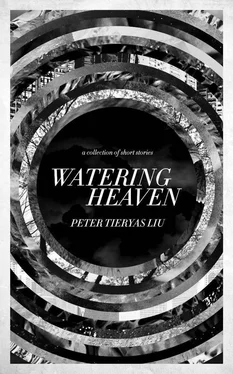She smiled. “Sounds fun.”
“Mandarin and English are both tricky languages. There’s nuances in both that are hard to capture in the other.”
“ Nuance ,” she said, marveling at the word. “Why are you really in Beijing?”
I looked at her. “I’m trying to heal,” I said.
“Beijing is your hospital, then? Or your brothel?”
“What?”
She laughed. “Westerners are always using Asia to get a hard-on. Don’t feel bad. I’m the same way. I’m addicted to Beijing, not in love with it. Every couple months, I get fed up, all the people, the constant noise, you know how it is. But when I leave, I get so lonely, I end up coming back.”
“I’ve never left,” I said.
“The faithful, boring lover no one ever appreciates,” she said, amused. “I want to show you something.”
“Show me something?” I responded.
“I compose piano melodies and I want to share my latest composition with you,” she said. I hesitated but she grabbed my hand, “Life’s like a big fart in your stomach — better if you just let go. C’mon, don’t be afraid.”
II.
I didn’t realize it was already 11 p.m. We were walking outside the apartments near East Sihui. The ground was uneven with loose gravel and bricks. The street lights were dim halos that hovered like frozen hummingbirds. A vendor was selling mushroom light bulbs, pink and purple neon sprouts gleaming in the night. Some of the homeless were sleeping on the sidewalks, bored security guards listened to their loud radios. There was a pickup truck that had sleeping bags in the back, exhausted workers snoring inside. A group of drunks engaged in a rabid game of Chinese poker, demanding more beer. The apartments were high-rises 15–20 stories high, a steppe of buildings compressed as closely together as possible. We entered her apartment building. She stomped the floor to trigger the light sensor. We went up to the 16 thfloor, then entered her unit. It was surprisingly spacious. I thought there were thirty people standing inside, but she flickered on the light and I saw they were mannequins. They looked surreally real, their flesh oozing credulity. All around us, the walls were covered with photos of people. Not figures as a whole, but parts spliced into assemblies. There was a menagerie of eyes, a collection of noses, a gamut of mouths. No two lips were the same: thick, thin, cut-up, moles covering each layer. At the center of the apartment, a grand black piano, polished smooth so that both of us were reflected upside down. The keys were ermine, the set of chords looking like an intricate rib cage on a charred torso.
“Can I make a confession?” she asked.
“Yeah.”
“I’ve never been able to fall in love with someone. Only pieces of them.”
“What do you mean?”
“I’ll fall in love with someone for their brows, their voice, the way they dress, the way their belly feels against mine when we make love. But never the whole,” she said.
“Why?”
“I don’t know. But it’s always been that way. Truth is, I’ve fallen in love with a piece of you,” she said.
“Me?”
“Yep.”
“Which piece?”
“Your fingers,” she answered.
I stared at her to see if she was joking. “What’s that mean?” I asked.
“I want to take a photo of your fingers — or better yet, let me cast them in clay. In exchange, you can have anything you want.”
“Anything I want?”
She nodded. “Home-cooked meal, friendship for an evening, company to anywhere you want. And if you play your cards right,” she said, “who knows?”
I turned to the photos. There must have been thousands.
“What exactly are you doing with them?”
“I collect the pieces I love and assemble the perfect human,” she answered.
“Why?”
“You ever hear about the Sculptor Buddha?” she asked.
“No,” I replied.
“He had to sculpt the statue of the perfect woman for the Celestial Palace, and he searched the whole world to find her. But every girl he found had some type of imperfection. So instead of using just one, he took the best elements from the women he admired and put them together. Afterward, he presented it to the emperor of the palace — who fell in love with the statue. But so did his three sons. A war broke out between them to control it.”
“What happened?” I asked.
“The head Buddha saw it was causing too much strife on Earth and ordered one of the blind Buddhas to take it away, bury it at the bottom of the sea. The waves who saw the statue tried to get her attention, and that was the start of hurricanes.”
“You trying to recreate this statue?”
“It’s just a story,” she replied, smiling. “But I do find inspiration in perfection — and imperfection. That’s what all great compositions do, right?”
“What?”
“Deify the ordinary.”
I considered it. “How often do you bring people?”
“Every night until I’ve completed one.”
“How many so far?”
“I have no idea,” she replied. “But you name the person, and they’re up there.” Pointing to one, “He’s an epileptic taxi driver with cerebral palsy. That’s an actor who only plays hermaphrodites. Delivery boy of divorce notices post-life, artist that paints through smell, a French pastry chef that makes odorless cuisines, a journalist who only writes obituaries for pigeons.”
“What happens if they refuse to come?”
“No one’s ever refused, though some come back more than once and I have to turn them away.”
Further along the wall, I saw women of different sized-breasts, varying splotches of pubic hair, soft cheeks, tough cheeks.
“Women too?” I asked.
“Feminine whimsy is usually more inspiring than masculine yearning.”
I felt dizzy, like a million eyes were watching me, lonely, vicious, avaricious, flowing into the ravine of essence, a disparate orchestra clashing within. It was like all of China was staring at me and suddenly I remembered the moment I decided to leave the States. Three years ago, I was running around a swimming pool. There was an especially wet area and I slipped, hitting my head on the concrete. The concussion knocked me out, and when I woke, I could no longer see through my right eye. Everything had become left-centric, a spherical partition sundering my vision in half. The world was incomplete, corruptibly contemptible. The job I’d fought so hard to get felt empty, and all my ambitions seemed juvenile — climbing the flaccid vines of opportunity while vying for attention from superiors who’d rather flirt with coordinators than listen to my concerns. And for what? Stress and a couple extra bucks that were like sucking popsicles in the Arctic. I realized the love of my life was a shell, a woman who wanted me to love her reflection and hated me when I saw through to the sutured seams of her bare body. I felt lost in a tundra of futility that found enthusiasm more daunting than climbing the thousand-story pavilions of Chinese myth. I knew my so-called ‘stability’ was a wooden igloo I’d been clinging to because I had no alternatives. My blindness had exposed my blindness and though my sight gradually returned, I couldn’t ignore all the things I saw. Vague, hazy splotches called to me, and one rancorously depressing morning, I found myself buying a one-way e-ticket for Beijing.
“What are you thinking about?” she asked.
I told her everything. Concluded by saying, “You love my fingers, but I hate your eyes.”
“Why?”
“Because they found me when I wanted to be lost.”
I suddenly grabbed one of the mannequins and smashed it into the ground. Seized a broken limb and hammered the others, pounding them to pieces. My wrath effused through my arms and legs. I was no longer human; instead, rage personified, the primordial savagery of instinctual chaos funneled into my fists. When I was done, there were a trail of mannequin corpses, murdered without mercy.
Читать дальше












